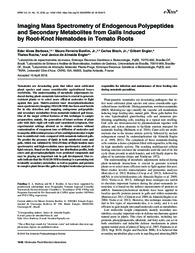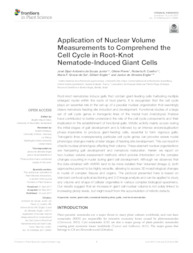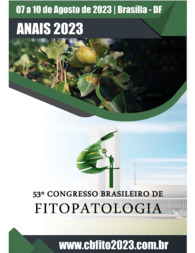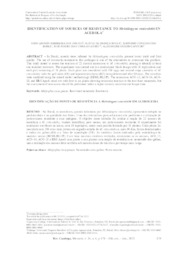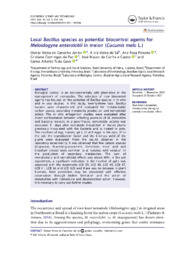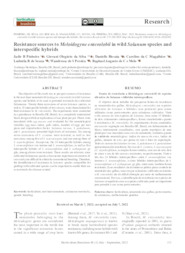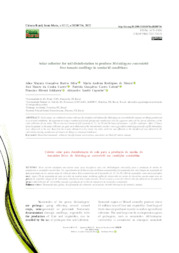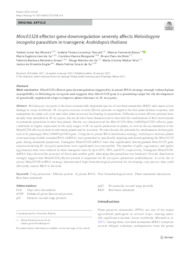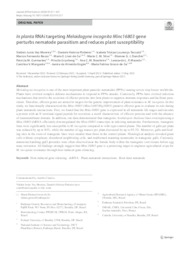Search Publications
Filter by:
| Author(s): BARBOSA, E. A.; BONFIM JÚNIOR, M. F.; BLOCH JUNIOR, C.; ENGLER, G.; ROCHA, T. L.; ENGLER, J. de A.
|
| Author(s): JUNIOR, J. D. A. de; PIERRE, O.; COELHO, R. R.; GROSSI-DE-SA, M. F.; ENGLER, G.; ENGLER, J. de A.
|
| Author(s): ARAÚJO, G. L. T.; BASSO, M. F.; MORGANTE, C. V.; SA, M. F. G. de Nematodes of the genus Meloidogyne pose a challenge to worldwide agricultural production, especially to economically relevant crops, such as cotton and soybean. They induce feeding sites on plant root... ... |
| Author(s): SANTOS, J. L. F. dos; SOUZA, F. de F.; BOREL, J. C.; CASTRO, J. M. da C. e; CAPUCHO, A. S. In Brazil, acerola trees infested by Meloidogyne enterolobii present lower yield and fruit quality. The use of rootstocks resistant to this pathogen is one of the alternatives to overcome this problem... ... |
| Author(s): CARVALHO JÚNIOR, O. V. de; SÁ, A. V. de; PEIXOTO, A. R; PAZ, C. D. da; CASTRO, J. M. da C. e; GAVA, C. A. T. Biological control is an environmentally safe alternative in the management of nematodes. The selection of new biocontrol agents has focused on the potential of Bacillus species in in vitro and in viv... ... |
| Author(s): PINHEIRO, J. B.; SILVA, G. O. da; BISCAIA, D.; MAGALHÃES, C. da C.; SOUZA, L. R. de; PEREIRA, W. de S.; MELO, R. A. de C. e The objective of this work was to prospect sources of resistance to the root-knot nematode Meloidogyne enterolobii in wild Solanum species and hybrids to be used as potential rootstocks for cultivated... ... |
| Author(s): SILVA, A. M. G. B.; MOURA, M. A. R. de; CASTRO, J. M. da C. e; CABRAL, P. G. C.; ISHIKAWA, F. H.; CAPUCHO, A. S. In this study, we validated a solar collector for disinfest soil infested by Meloidogyne enterolobii for tomato seedlings production in semiarid conditions. An experiment using a randomized block desi... ... |
| Author(s): MOREIRA, V. J. V; LOURENCO, I. T.; BASSO, M. F.; SÁ. M. E. L. de; MORGANTE, C. V.; MELO, B. P.; ARRAES, F. B. M.; SÁ, D. M. de; SILVA, M. C. M. da; ENGLER, J. de A.; SA, M. F. G. de Minc03328 effector gene downregulation triggered by in planta RNAi strategy strongly reduced plant susceptibility to Meloidogyne incognita and suggests that Minc03328 gene is a promising target for th... ... |
| Author(s): PINTO, T. J. B.; CUNHA, D. F.; SILVA, G. O. da; PINHEIRO, J. B.; CORREIA, V. R.; RAGASSI, C. F.; CARES, J. E. The root-knot nematode, Meloidogyne enterolobii, is an important pathogen of numerous crops, including the so-called pulses. Hence, it is necessary to identify genetic resistance, as it is the most ef... ... |
| Author(s): MOREIRA, V. J. V.; PINHEIRO, D. H.; LOURENCO, I. T.; BASSO, M. F.; LISEI-DE-SA, M. E.; SILVA, M. C. M. da; DANCHIN, E. G. J.; GUIMARAES, P. M.; GRYNBERG, P.; BRASILEIRO, A. C. M.; MACEDO, L. L. P. de; MORGANTE, C. V.; ENGLER, J. de A.; SA, M. F. G. de Meloidogyne incognita is one of the most important plant-parasitic nematodes (PPNs) causing severe crop losses worldwide. Plants have evolved complex defense mechanisms to respond to PPNs attacks. Con... ... |
Observation
Some of Embrapa's publications are published as ePub files. To read them, use or download one of the following free software options to your computer or mobile device. Android: Google Play Books; IOS: iBooks; Windows and Linux: Calibre.
Access other publications
Access the Agricultural Research Database (BDPA) to consult Embrapa's full library collection and records.
Visit Embrapa Bookstore to purchase books and other publications sold by Embrapa.

